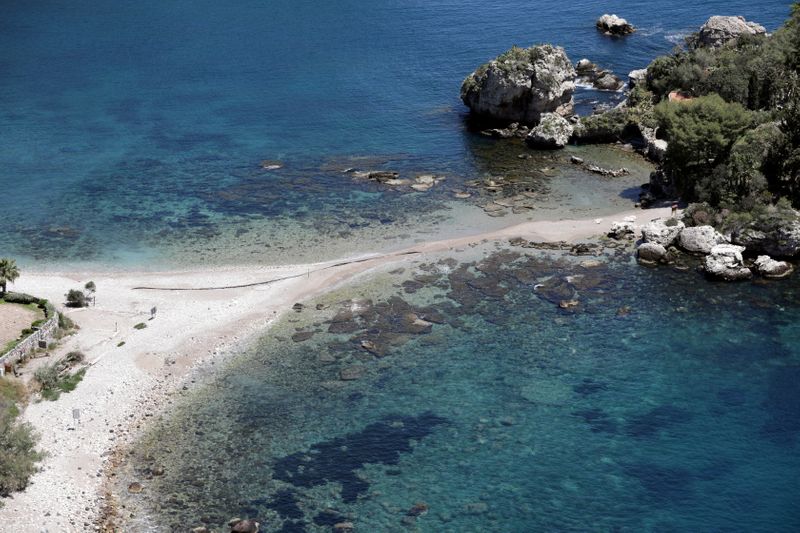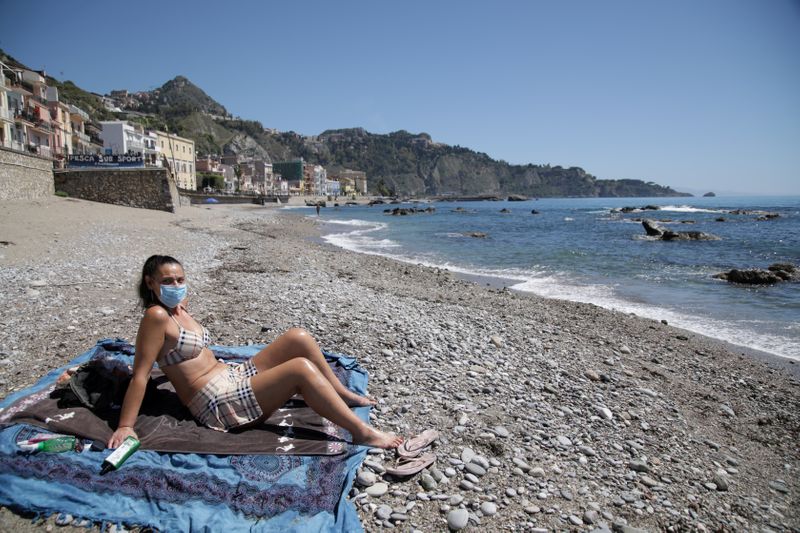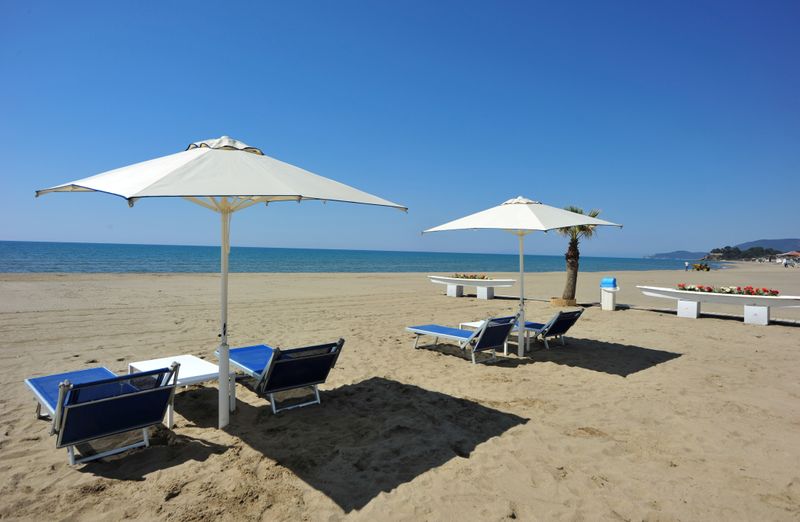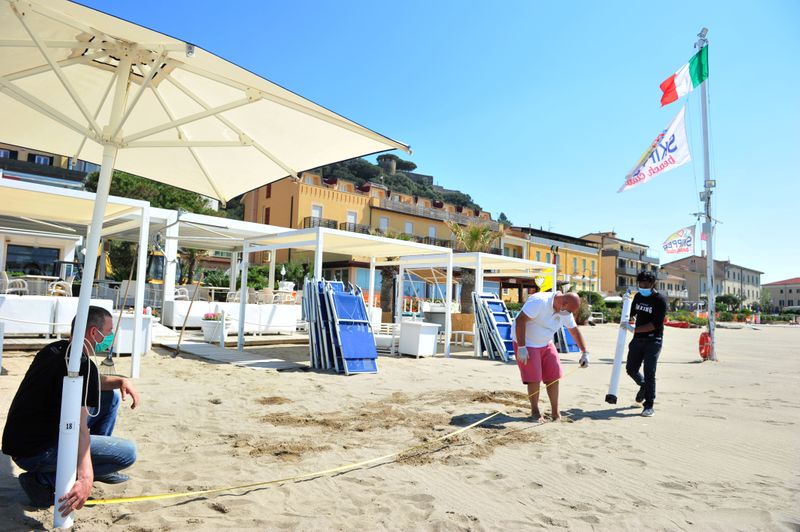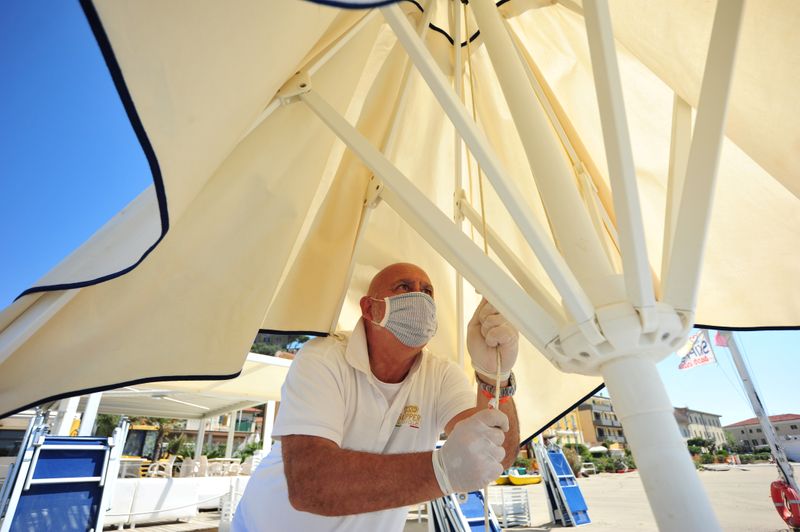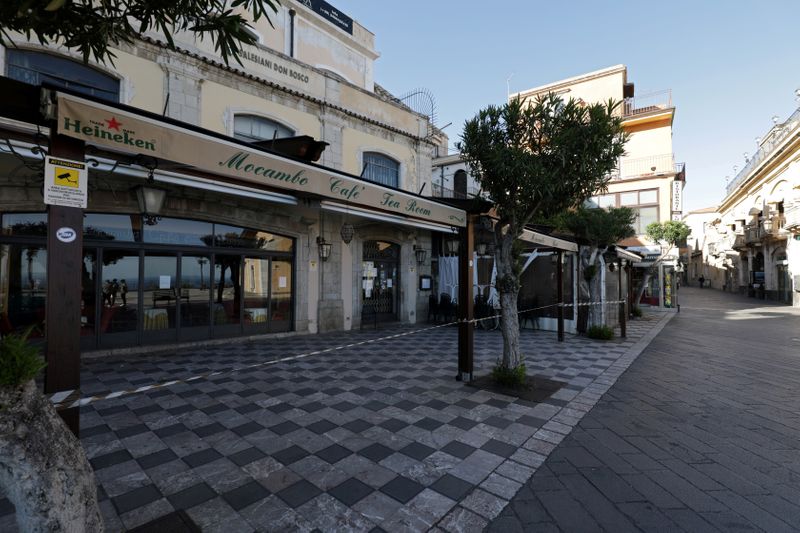TAORMINA/BOLOGNA/MILAN (Reuters) – Visitors to Italy’s famous beaches could be in for a surprise this summer. Umbrellas will be spaced far apart, hand gel will be readily available and even electronic tagging and booking systems have been proposed.
These are just some of the changes resorts are considering to be able to reopen in time for the peak season, as the country slowly emerges from a strict lockdown imposed to contain the coronavirus pandemic.
Despite the challenges, Claudio Ambrogetti, who has run Taormina’s Il Delfino beach for the past 15 years, remains upbeat.
“This has been a difficult period for our city, but the beach establishments are ready to reopen as soon as we have the guidelines,” he said.
Like many “bagnini”, or beach managers, along Sicily’s sun-drenched shores, he is hoping health protocols and distancing rules – which still need to be signed off before shutters can be lifted – will allow trade to start in June, even if it is likely to be local.
For small family beach businesses, many already cramped for space, proposals including a minimum 5 metres between umbrellas, one-way tourist-flow systems, hand gel dispensers and regular sanitization of restrooms could prove costly.
Italy, one of the countries hardest hit by the pandemic, began easing restrictions, but Italians are still not allowed to travel outside their regions and foreign travel has ground to a halt.
“We are ready to reopen, but if tourists do not come back, if borders are not reopened, and if hotels do not fill up, the costs of running a restaurant will be unsustainable,” said Salvatore Parisi, owner of Baronessa, one of Taormina’s top restaurants.
TOURISM VITAL TO ITALY
Brussels is pushing to reopen borders for summer tourism, but governments are likely to have to do so at different speeds.
Italy is heavily dependent on tourism, which accounts for 13% of GDP and employs around 13% of the workforce. It has been hit hard by the pandemic, which forced borders to close, restaurants and hotels to shut and airlines to ground flights.
Italy’s National Tourism Agency Enit said it would take three years for the industry to recover to 2019 levels.
According to think-tank Nomisma, around 500,000 summer jobs could be at risk this year due to fallout from the virus, while 100 billion euros could be lost as holiday-makers stay away.
Italy’s roughly 8,000 km-long coastline, home to around 11,000 beach businesses, accounts for 37% of tourist revenue. That share is much higher in islands like Sicily and Sardegna and the less wealthy south.
To date the south has escaped the level of damage suffered by regions in the north, where the virus first struck.
In the Isole Eolie area around Sicily there have been only a handful of cases and authorities there have called for the creation of a Safe Zone to help get tourists back.
Christian Del Bono, chairman of the area’s hotel association Federalberghi, said town mayors had sent a letter to Rome to ask to set up tests and health protocols to screen flows.
“Noone’s thinking of making money, our aim at this stage is simply not to go bankrupt,” he said.
NO MORE HUGGING
The rich northern region of Emilia Romagna earns some 13 billion euros from its closely-packed Riviera beaches near Rimini, around 70% of its tourist revenue. Beach owners there are fretting over their livelihoods.
“This business is all about shaking hands and hugging people. Now we’ll have to make do with a little wave and a smile of the eyes over a mask,” Danilo Piraccini told Reuters.
He has been running the Bagno Milano beach in Milano Marittima with his sister Silvana for years.
Piraccini is hoping to start by June. With foreign tourists virtually out of the picture and distancing rules set to eat into business, he expects some 60% less fare than last year.
Prices may have to rise but costs will go up too since he’ll need more people to sanitize outbuildings, steward the beach and stop small children getting too close. Insurance costs could also rise if COVID-related risks are to be properly covered.
“But anyway we have to open even if it means losing money. We have no choice. The alternative is we lose clients,” he said.
Tourism, like other industries, is looking for help.
The Italian government last month approved an emergency scheme to offer over 400 billion euros worth of liquidity and bank loans to firms hit by the coronavirus crisis.
On Wednesday Rome approved a further decree scrapping some tax payments scheduled for June.
But the beach business has traditionally been based on debt and cash flows, and some are concerned delays in processing state-backed loans from banks could create a shortfall.
To manage flows, bagnini are being urged to consider solutions including booking systems and apps to assign time slots and electronic bracelets to count and control beachgoers.
To improve protection, one company has even offered to build plexiglass booths for beach owners to create safe spaces.
“We’ll be coming up with a few innovative measures of our own but the plexiglass idea is out,” said Piraccini. “You may not get coronavirus, but you’ll get everything else from sunburn to exhaustion.”
(Reporting by Antonio Parrinello in Taormina, Stephen Jewkes in Bologna, Giuio Piovaccari in Milan; Editing by Mike Collett-White)

